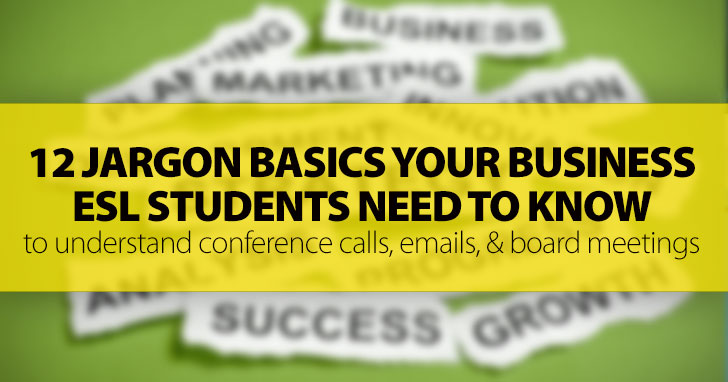Reports, Meetings, and Presentations: Core Activities for Business ESL


It is critical to teach your advanced business students – or even intermediate students –jargon basics to navigate those overseas conference calls, emailed instructions from employers, and board meeting round table discussions. Here are 12 vital expressions hand-picked out of real international professional correspondences for frequency of use to get you started.

When your boss tells you it is “need to know”, that means she is confiding the information in you because that information is necessary for you to perform your job, but you should not share the information with anyone else. It is a secret!
This idiom comes from baseball and refers to a player needing to “touch” the base with his foot or hand to not be out. Players are trained to always touch base between plays to make sure they stay safe. In the workplace, 'touch base' means check in with the boss or a colleague just to make sure the project is on task or no problems are impeding work. If somebody emails you, “We need to touch base,” he wants to communicate.
This is jargon for a plan to make more money. Companies want to grow to earn more profits.
Crunching is clenching something tight, usually a muscle. It refers to tightening operations to get a job done efficiently.
This means simply to take the next step, or to get past a bad work experience and improve a situation.
When jargon-ites say that they want to “scale back”, they want to reduce operations on a job or a task because it is moving slower than they expected or they are not making as much money as expected.
In an analysis of 50 emails and messages from international clients from more than 10 different countries, this expression appears more than any other on this list. It means that you are reading together, “on the same page” of the book – that you understand each other.
That which each person on the team can add or contribute, or “bring” to the meeting “table”.
Milestones are markers on trails or old dirt roads to indicate when a mile has passed. In business, they are points of completion for a large project.
Business people use this term to refer to something that is different or creative – a new idea that is outside, or apart, from traditional thinking. It is an important and positive aspect of the innovation that is necessary for effective capitalism and entrepreneurship.
This is shorthand for “I win; you win” or “we both win”. It is a situation where two people or groups of people are at an advantage and gain from it.
This word specifically means cut the unnecessary components from a process to make it more efficient. “Streamline the production process to use less water.” Streamlining cuts costs and makes a process happen faster.
Print this list and discuss it with your students, or try incorporating jargon into homework assignment explanations. You can even have a 'jargon day' where students try to only communicate with you and each other using expressions! The student that uses the most expressions correctly can win a prize for that day.
You could also explain one or two expressions each day of class and use throughout the day while teaching other concepts. Write the expression on the board and talk about it as a quick icebreaker at the beginning of the day.
Alternatively, provide the jargon list to students, and ask them to write you or a classmate an email incorporating 3 expressions. You or the pair can write back in jargon and check for learning by asking questions in jargon.